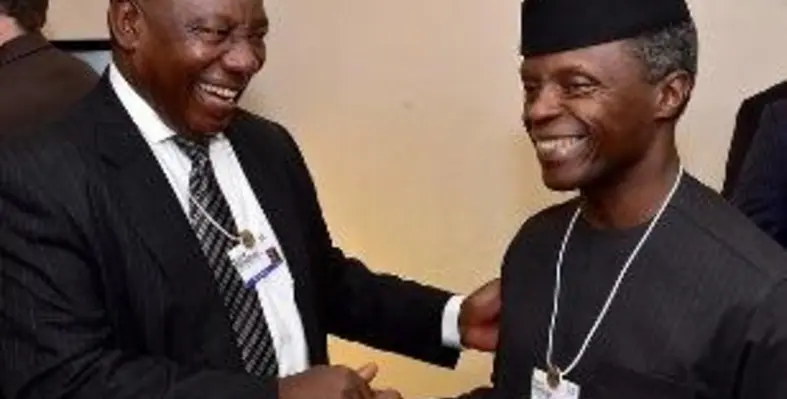Yemi Osinbajo, vice president of Nigeria, shares his thoughts on Africa at the World Economic Forum in Switzerland, at an interactive session entitled "Stabilising The Mediterranean"
How realistic is it for Africa to replace China as the factory of the world?
Vice president: Let me begin with the Africa Rising narrative and all of the possibilities around Africa replacing China as the factory of the world. I think that probably is in the natural cause of things. Even now, we see that as wage costs go up in China, Africa is becoming the obvious choice for some certain industries, so it is clear that will happen and there are quite a few initiatives in that direction already. There are countries like Côte d'Ivoire and Nigeria, with the development of Special Economic Zones, and partnerships coming from China.
I think those sort of arrangements will very quickly absorb labour because obviously, you are looking at growing populations in Africa. In the next 20 years or so, we are looking at the youth population probably being 70 per cent of Africa’s population. The critical thing is to see that we cannot deal with this in any quick way, there are no quick fixes to this, we have got to look at this long term, because clearly there’s no way that African economies will be able to meet all of the expectations, especially concerning all of the projections around population.
What do you think about the Marshall Plan for Africa, is it credible?
The idea of the Marshall Plan is to me, in some sense, bringing old solutions to what really is a dynamic problem. I think that what Africa needs and what a lot of the southern neighbours of the Europeans need are fairer trade policies and policies that centre on job creation in those locations and more investments, but I think more thinking through those ideas and policies that creates more opportunities through the partnership between Europe and Africa.
We really does deserve a global solution and the way to look at that is by coming together to reason these things through, but frankly it is not by the Marshall Plan. I think it is more nuanced than that.
Do you feel that values of human rights are being compromised in order for Europe to have tactical immediate solutions?
Vice president: I certainly agree that it was a great shock to see actual slave dealings in this century; it was absolutely horrifying. What we are seeing is a degeneration of criminal activities where you find that state capacity is unable to maintain international human rights norms.
One of the crucial things is to encourage repatriation. The Nigerian government, for example, is working with the Libyan government to repatriate everyone in the camps. It is a slow process because there are those who claim nationalities as a way out of the camps. There is also a great deal of willingness on the part of those who are in the camps to go back because it is entirely voluntary. There is pressure where there is no state capacity or inadequate state capacity to maintain law and order and international human rights norms. The pressure is a bit too much for the Libyan authorities, so what you find is that the criminal gangs and all of these asymmetric type organizations dominate the space and we may not be able to do much without relieving the Libyan authorities of a lot of the illegal migrants in their custody.
Five years from now, are we still going having the same discussion?
Vice president: Would you give us a chance to say, I hope not?, but I really suspect yes.
Marshall Plan for Africa is a major development aid programme












